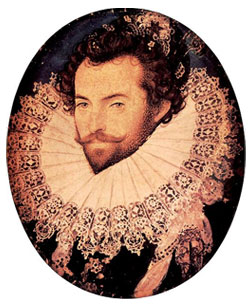Two Riddles
These poems have right answers. Does that diminish them?

Poetry of the 16th and early 17th century demonstrates the profundity of playing and feigning as human actions: The sonnets of that time play with all sorts of social and sexual poses, laughing at courtly and carnal love while also being wholeheartedly courtly and carnal.
Walter Raleigh (c. 1552-1618), a courtier who denounced the court, a skillful soldier and poet and politician (eventually beheaded despite those skills—or because of them), wrote two memorable riddles that are also wonderful poems.
Consider the last two lines of Raleigh's "On the Cards and Dice" below: "An herald strange, the like was never born,/ Whose very beard is flesh, and mouth is horn." They give me a slight shiver still. Twenty-five years ago, I used them as an obstacle to be solved in an interactive text adventure I wrote in the early days of that genre. (The player-reader of Mindwheel, as my "electronic novel" was called, had to solve the identity of the "herald strange" in order to advance the narrative and free an ally—a winged woman, as I remember.)
These final lines lead to a specific, rational solution: Raleigh's flesh-bearded herald is a rooster. But do such puzzles, devised to be unlocked with such a simple answer, celebrate our sense of mystery or mock it? (For some readers, the poem may suggest doomsday or the second coming—with a hint of nativity at the end?) Like the flirtatious, showboat eloquence of a sonneteer, this poem's artful puzzle-posing may suggest the elegant diversions of the royal court, social and intellectual. But does the poetry evaporate along with the literal mystery?Is the poetic quality of Raleigh's lines dispelled by realizing that a rooster is the herald of daybreak, hatched rather than born? That his beak is a "mouth of horn" and his wattle a "beard of flesh"? Or does the poem retain its power even after the riddle has been solved?
Whoever gave Raleigh's poem its traditional title, "On the Cards and Dice," provides a riddle-spoiler right from the outset. That giving-away of the game seems to assume that the poem works beyond its game-playing. Does it, despite its self-parody of mysterioso rhetoric, somehow elevate banal games of chance like cards and dice? The poem as a whole is, after all, itself a kind of game. Or does this piece of writing simply debunk the tone and language of prophecy, mocking themanners of mystery?
"On the Cards and Dice"
Before the sixth day of the next new year,
Strange wonders in this kingdom shall appear:
Four kings shall be assembled in this isle,
Where they shall keep great tumult for awhile.
Many men then shall have an end of crosses,
And many likewise shall sustain great losses;
Many that now full joyful are and glad,
Shall at that time be sorrowful and sad;
Full many a Christian's heart shall quake for fear,
The dreadful sound of trump when he shall hear.
Dead bones shall then be tumbled up and down,
In every city and in every town.
By day or night this tumult shall not cease,
Until an herald shall proclaim a peace;
An herald strange, the like was never born,
Whose very beard is flesh and mouth is horn.......................................... .....—Sir Walter Raleigh
Click the arrow on the audio player to hear Robert Pinsky read "On the Cards and Dice." You can also download the recording or subscribe to Slate's Poetry Podcast on iTunes.
Some versions of "On the Cards and Dice" have the herald "strong" rather than "strange" in the penultimate line. I use the version with "strange" not on scholarly grounds but because I like it better.
There are even more editorial variants on a poem Raleigh wrote to his son. There is a sonnet version, which I consider lame: somebody's pedantic explanatory couplet unnecessarily soldered onto a good poem. And the three quatrains I use here are sometimes printed without the little four-word coda, which I think adds a considerable frisson to this strange—to borrow that disputed word—and, I think, unforgettable poem:
"Sir Walter Raleigh to His Son"
Three things there be that prosper up apace,
And flourish while they grow asunder far;
But on a day, they meet all in a place,
And when they meet, they one another mar.And they be these: the Wood, the Weed, the Wag:
The Wood is that that makes the gallows tree;
The Weed is that that strings the hangman's bag;
The Wag, my pretty knave, betokens thee.Now mark, dear boy—while these assemble not,
Green springs the tree, hemp grows, the wag is wild;
But when they meet, it makes the timber rot,
It frets the halter, and it chokes the child..............God bless the child!
......................................... .....—Sir Walter Raleigh
Click the arrow on the audio player to hear Robert Pinsky read "Sir Walter Raleigh to His Son."
(You can find "Sir Walter Raleigh to His Son" discussed with learned penetration by the poet-scholar Linda Gregerson and read by her and two other splendid poets on the Atlantic's Web site.)
For me, these poems exemplify how the feeling of a magnetic, prized, and somehow illuminating mystery survives any literal solution. Explanation is not necessarily demystification.
Slate Poetry Editor Robert Pinsky will be participating in the Poems "Fray" this week. Post your questions and comments on "On the Cards and Dice" and "Sir Walter Raleigh to His Son," and he'll respond and participate. (In the interest of keeping the discussion as rich as possible, please read existing commentsbefore posting your own.) You can also browse "Fray" discussions of previous classic poems.